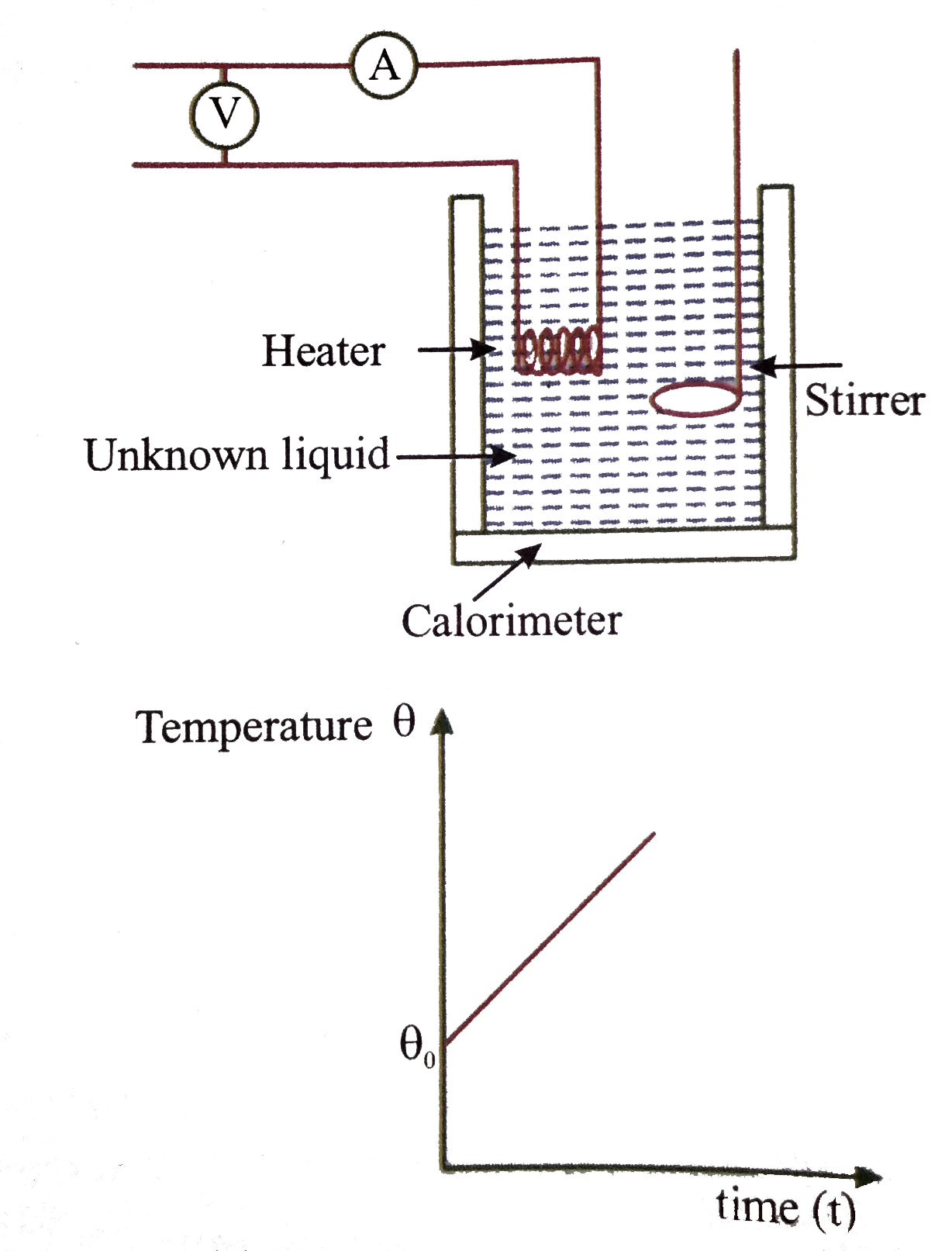In electrical calorimeter experiment, voltage across the heater is 100.0V and current is 10.0A. Heater is switched on for t =700.0s. Room temperature is θ0=10.0∘C and final temperature of calorimeter and unknown liquid is θf=73.0∘C. Mass of empty calorimeter is m1=1.0kg and combined mass of calorimeter and unknown liquid is m2=3.0kg. Find the specificheat capacity of the unknown liquid in proper significant figures. Specific heat of calorimerter = 3.0×103j/kg.∘C.
The correct Answer is:A, C, D
Given, V=100.0V,i=10.0A,t=700.0s,θ0=10.0∘C,θf=73.0∘C,
m1=1.0kg and m2=3.0kg
Substituting the values in the experssion.
Sl=(1m2−m1)[Vitθf−θ0−m1Sc]
we have, Sl=13.0−1.0[(100.0)(10.0)(700.0)73.0−10.0−(1.0)(3.0×103)]
=4.1×103j/kg.∘C
(According to the rules of significant figures).
Topper's Solved these Questions
- EXPERIMENTSBook:DC PANDEYChapter:EXPERIMENTSExercise:Exercise 3.1
Explore 2 Videos
- EXPERIMENTSBook:DC PANDEYChapter:EXPERIMENTSExercise:Exercise 3.2
Explore 2 Videos
- ELECTROSTATICSBook:DC PANDEYChapter:ELECTROSTATICSExercise:Integer
Explore 17 Videos
- FLUID MECHANICSBook:DC PANDEYChapter:FLUID MECHANICSExercise:Medical entranes gallery
Explore 49 Videos
Similar Questions
In this experiment voltage across the heater is 100.0V and current is 10.0A and heater was switched on for t=700.0sec Initially elements were at room temperature θ0=10.0∘C and final temperature was measured at θ=73.0∘C Mass of empty calorimeter was 1.0kg and the combined mass of calorimeter + liquid is 3.0kg THe specirfice of the calorimeter Sc=3.0×103J/kg∘C The fall in temperature 350 second after switching off the heater was 7.0∘C Find the specific heat capacity of the unknown liquid in proper significant
(A) 3.5×103J/kg∘C (B) 3.50×103J/kg∘C (C) 4.0×103J/kg∘C (D) 3.500×103J/kg∘C .
View SolutionThe temperature of a calorimeter increases 0.10K when 7.52J of electric energy is used to heat it. What is the heat capacity of the calorimeter?
View Solution
Knowledge Check
Figure shows an electrical calorimeter to determine specific heat capacity of an unknown liquid, First of all, the mass of empty calorimeter (a copper container) is measured and suppose it is m1. Then the unknown liquid is poured in it. Now the combined mass of calorimeter+liquid system is measured and let it be m2. So the mass of liquid is (m2−m1). Initially both were at room temperature (θ0).
Now a heater is immeresed in if for time interval t. The voltage drop across the heater is V and current passing through it is I. Due to heat supplied, the temperature of both the liquid and calorimeter will rise simultaneously. After tsec, heater was switched off, and final temperature is θr. If there is no heat loss to surroundings. Heat supplied by the heater=Heat absorbed by the liquid+heat absorbed by the calorimeter (VI)t=(m2−m1)S1(θf−θ0)+m1Sc(θf−θ0)
The specific heat of the liquid S1=(VI)tθf−θ0−m1Sc(m2−m1)

Radiation correction: There can be heat loss to environment. To compensate this loss, a correction is introduced.
Let the heater was on for tsec, and then it is switched off. Now the temperature of the mixture falls due to heat loss to environment. The temperature of the mixture is measured t/2sec. after switching off. Let the fall in temperature during this time is ɛ
Now the corrected final temperature is taken as θf=θf+ɛ
In this experiment voltage across the heater is 100.0V and current is 10.0A, and heater was switched on for t=700.0sec. Initially all elements were at room temperature θ∘=10.0∘C and final temperature was measured as θf=73.0∘C.
Mass of empty calorimeter ws 1.0kg and the combined mass of calorimeter + liquid is 3.0kg. The specific heat capacity of the calorimeter =3.0×103J/kg∘C. The falls in temperature 350 second after switching off the heater was 7.0∘C. Find the specific heat capacity of the unknown liquid in proper significant figures.A3.5×103J/kg∘CB3.50×103J/kg∘CC4.0×103J/kg∘CD3.500×103J/kg∘CSteam at 100∘C is passed into 1.1kg of water contained in a calorimeter of water equivalent 0.02kg at 15∘C till the temperature of the calorimeter and its content rises to 80∘C. What is the mass of steam condensed? Latent heat of steam = 536cal/g.
A.0130B0.065C0.260D0.1355gm of steam at 100∘C is passed into calorimeter containing liquid. Temperature of liquid rises from 32∘C to 40∘C. Then water equivalent of calorimeter and contents is
A40 gB375 gC300 gD160 g
Steam at 100∘C is passed into 1.1kg of water contained in a calorimeter of water equivalent 0.02kg at 15∘C till the temperature of the calorimeter and its content rises to 80∘C. What is the mass of steam condensed? Latent heat of steam = 536cal/g.
View Solution50 g ice at 0∘C is dropped into a calorimeter containing 100 g water at 30∘C. If thermal . capacity of calorimeter is zero then amount of ice left in the mixture at equilibrium is
View SolutionA copper sphere of 100 g mass is beated to raise its temperature to 100∘C g mass is heated to raise its temperature to 100∘C and is released in water of mass 195 g and teperature 20∘C in a copper calorimeter. If the mass of clorimeter is 50 g. what will be the maximum temperature of water? (Give : specific heat of copper =0.1cal/g∘C and specific heat of calrimeter =0.1 cal / g ∘C
View SolutionA copper sphere of 100 g mass is beated to raise its temperature to 100∘C g mass is heated to raise its temperature to 100∘C and is released in water of mass 195 g and teperature 20∘C in a copper calorimeter. If the mass of clorimeter is 50 g. what will be the maximum temperature of water? (Give : specific heat of copper =0.1cal/g∘C and specific heat of calrimeter =0.1 cal / g ∘C
View SolutionA copper sphere of 100 g mass is heated to raise its temperature to 100∘C and is released in water of mass 195 g and temperature 20∘C in a copper calorimeter. If the mass of calorimeter is 50 g, what will be the maximum temperature of water?
View Solution
